Global Plastics Treaty: INRAE scientists engaged in the negotiations
United Nations member states are currently negotiating a legally binding treaty to end plastic pollution. Several INRAE researchers are working behind the scenes to provide scientific support. They are providing rigorous, independent expertise as the negotiations lack an official scientific framework. In this way, publicly funded research discoveries can help inform international policymaking.
Published on 29 July 2025
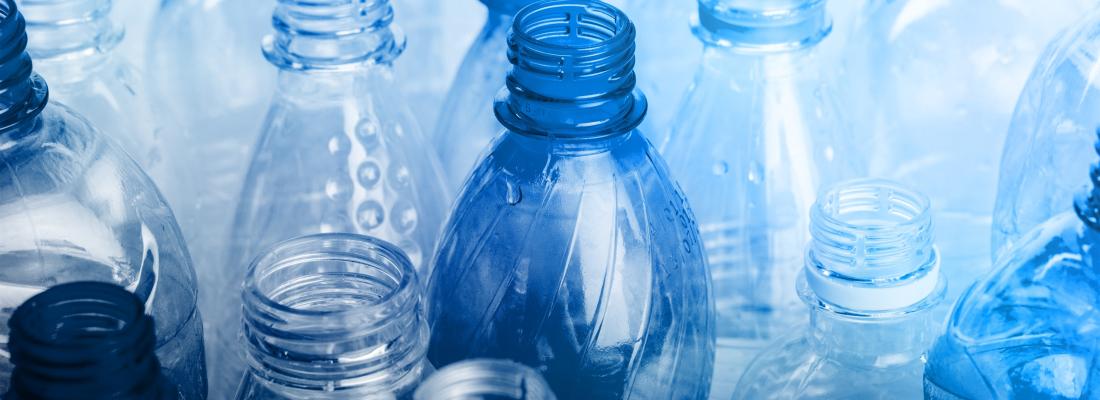
Three INRAE scientists with complementary expertise in plastics are attending the negotiation sessions: Xavier Cousin, a physiologist studying how plastics affect fish; Marie-France Dignac, a geochemist working on microplastics in soils, and Muriel Mercier-Bonin, a toxicologist exploring the effects of microplastics on the digestive system. Over the course of their research, they all became more familiar with the toxic effects of plastics and felt compelled to help inform policymaking.
"When the [Plastic Pollution] INC-2 was held in Paris, I was not accredited, but I was able to attend the parallel events," says Dignac, "It was then that I realized just how much our research could contribute to the debate." During this period, the three researchers joined The Scientists' Coalition for an Effective Plastics Treaty, an international network created in 2022. The coalition has brought together over 450 scientists from more than 65 countries and was formed because there was no official scientific body associated with negotiations around the plastics treaty. Such had not been the case for other international treaty negotiations, such as those focused on the climate or biodiversity.
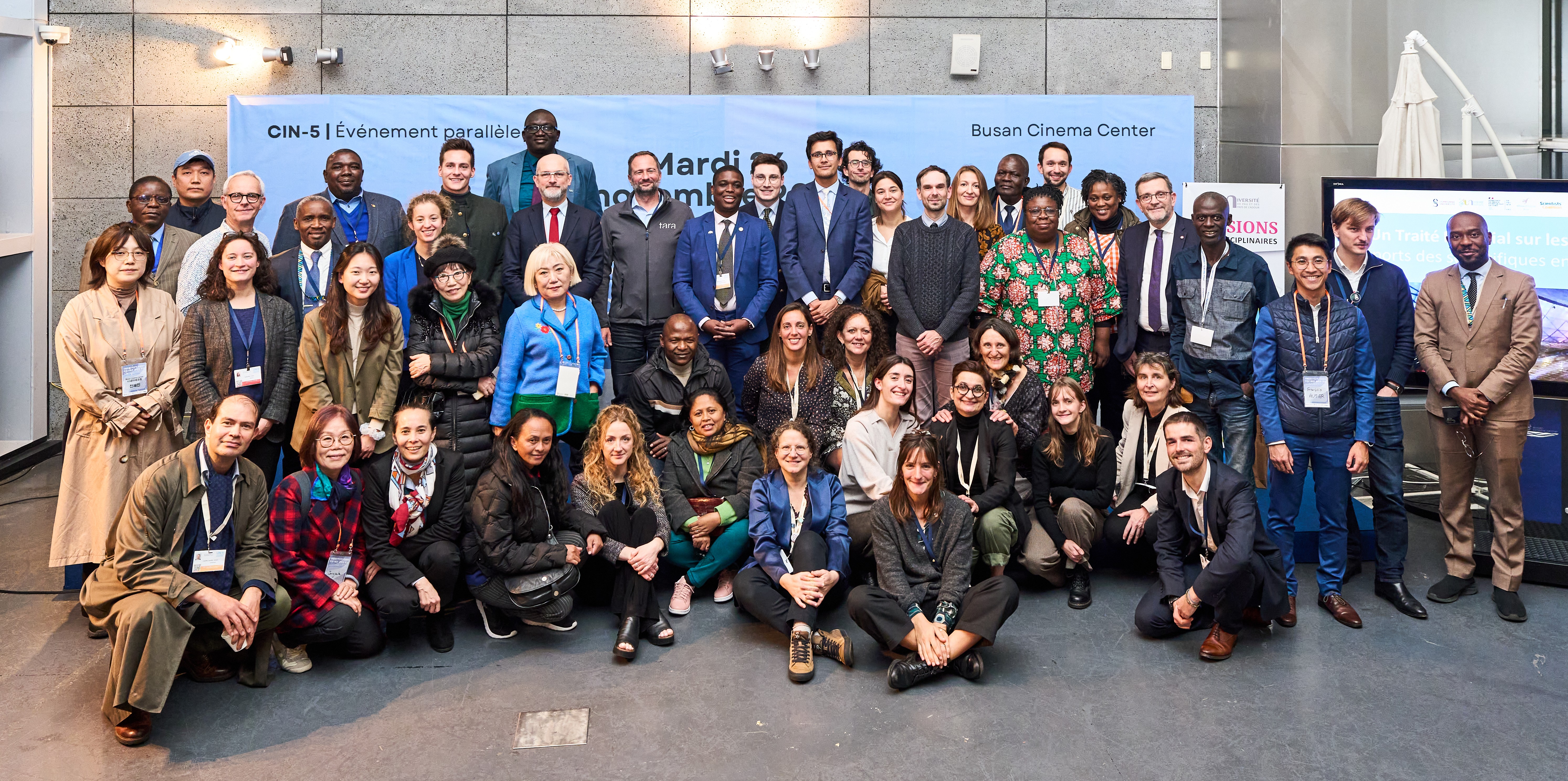
International treaty negotiations in the absence of official scientific guidance
- Plastics Treaty negotiations were launched in 2022 by the United Nations Environment Assembly (UNEA) and must result in a legally binding text by the end of 2025. After five negotiating sessions, member states are still struggling to agree on the treaty’s objectives, implementation mechanisms, and actual scope. A decisive session, CIN-5.2, will take place in August 2025 in Geneva to try to overcome these stumbling blocks.
- The Scientist’s Coalition has taken on the responsibility of providing rigorous, independent scientific expertise that can be immediately deployed during the negotiations. The group has no institutional mandate; instead, it is driven by scientific diplomacy based on transparency, collegiality, and public service.
With the backing of INRAE, Cousin, Dignac, and Mercier-Bonin were able to join the French delegation as observers starting with the CIN-3 session. Observer status grants them a unique position: they can be present during work sessions without officially representing France and can thus remain impartial. "Joining an NGO was also an option but that could have compromised the independence and scientific rigour we want to adhere to during these negotiations," explains Dignac.
Direct support for negotiators
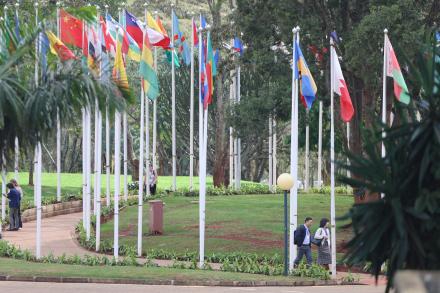
In Nairobi (session CIN-3), Ottawa (session CIN-4), and Busan (session CIN-5), the three researchers joined forces with other international researchers (71 in Busan), including a dozen French speakers. They created a close-knit group to provide direct support to the negotiators. Their multifaceted role has been to identify delegates' needs, respond to urgent requests, and provide much-needed scientific clarity.
Depending on the situation, this work may entail explaining the consequences of a regulatory choice, shedding light on oft-confused concepts (e.g., explaining the difference between bioplastics and biodegradable plastics), or supplying accurate information in the face of scientifically unfounded arguments.
"As active members of the coalition, we’ve also been asked to review or contribute to documents, articles, and proposals," adds Mercier-Bonin. She continues, "We feel that our work has meaning, that it is part of a committed collective dynamic. While it is demanding, and sometimes exhausting, there is also a strong sense of solidarity and incredible collective energy." She also observes these dynamics within the younger generation of scientists: "I'm impressed by the engagement and expertise of young researchers from France and elsewhere. They contribute tremendously to all stages of the negotiation process."
Ensuring a voice for francophone delegations
- The first time they took part in a session (CIN-3), Dignac and a colleague from Le Mans University, Fabienne Lagarde, quickly identified a serious concern. Dignac explains, "There was a lack of communication between the scientists and the delegations from French-speaking African countries, partly due to the language barrier. We therefore reached out directly to these delegations."
- To facilitate the dialogue, the French researchers also began to systematically translate the documents produced by The Scientists’ Coalition. At the following session, these efforts fostered further exchanges, notably with delegations from Congo, Côte d'Ivoire, Madagascar, Mali, Benin, Gabon, and Guinea. "It was a major moment for us when several delegations from French-speaking African countries took the floor during the plenary of the CIN-5 session, something they hadn't done before. Of course it's difficult to know for sure, but we thought that maybe the relationship building and exchanges that occurred over the few months prior might have helped create a more favourable environment," notes Cousin.
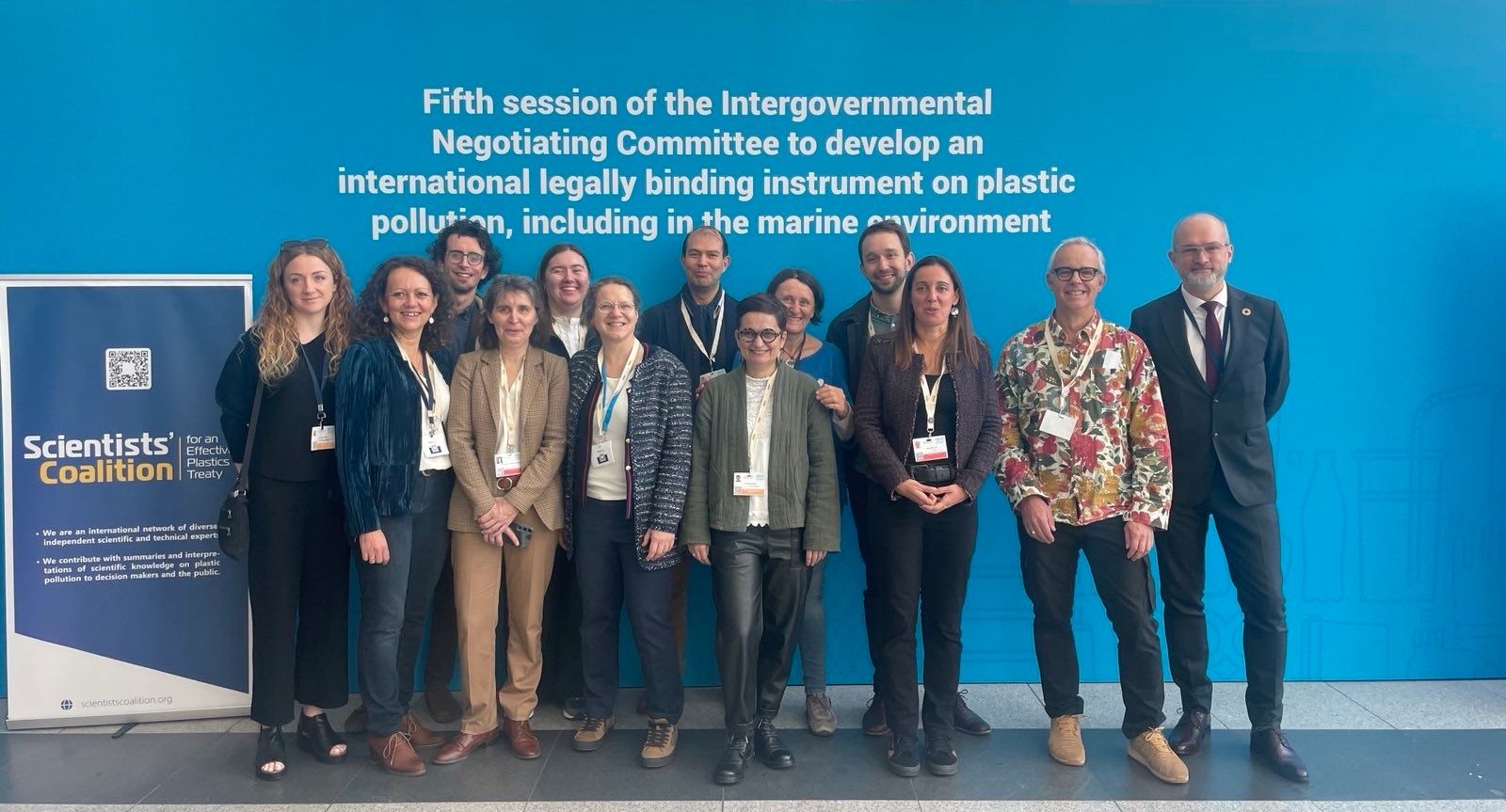
“Sounding the alarm is part of our role”
“If we stay on our current trajectory, soon no one on this planet will be able to enjoy a healthy environment.” - Marie-France Dignac
It is because of their scientific independence that the researchers have been able to establish themselves within the broad landscape of players already involved with the delegations, NGOs, industrial stakeholders, and lobbying groups. They are volunteers without commercial interests or political agendas, and they are clear about their one objective. "Our goal is to provide highly rigorous and objective information regarding the environmental risks and health risks associated with plastics," states Dignac.
"Sounding the alarm is part of our role as scientists," she insists. It is urgent to sound the alarm because plastics are accumulating everywhere. They are in the oceans, soils, and living organisms; they are even found in the most remote environments, like snow in the Arctic. Dignac warns, "If we continue on this track, the reality will soon be that no one on this planet will be able to benefit from a healthy environment." This observation touches on more than just science. It also highlights the issue of environmental justice. The right to a healthy environment is currently recognised as a fundamental human right by the UN. Yet, this right could become globally meaningless.
At the CIN-4 session, the researchers noted that certain delegates had a real need for scientific or technical clarification. These individuals were often focused on several issues -the climate, biodiversity, desertification- but did not necessarily have access to a team with specific expertise in plastics. "In general, there have been three main points of confusion," comments Cousin.
- The first is the distinction between biodegradable plastics, bioplastics, and biobased plastics. He explains, "The term 'bioplastic' is often used in a vague way, sometimes deliberately to suggest the presence of ecological benefits that do not always exist."
- The second is related to recycling, which is sometimes seen as a universal solution. He elaborates, "Lobbyists very actively present recycling as a remedy for all our problems, which results in an inflated perception of its effectiveness relative to the plastic crisis. Consequently, we sometimes overestimate the ability of recycling to cope with the problems caused by plastics."
- The third is tied to the chemicals associated with plastics. "In some regions, open-air incineration is still used, and it has particularly harmful health effects. Based on the discussions we've engaged in, we’ve seen that people are still largely unaware of these risks," emphasises Cousin.
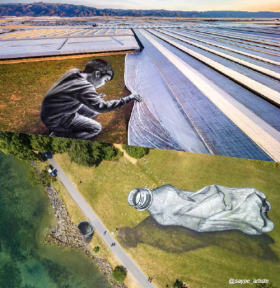
A collective scientific assessment on plastics used in agriculture and food systems
Published in May 2025, this collective assessment mobilised 30 European researchers and over 4,500 scientific references to evaluate the uses, properties, and impacts of plastics throughout their life cycle. The findings are alarming: plastics are present everywhere - from air, water, and soil to food and living organisms. In France, agricultural soils appear to be major sinks for this pollution, particularly due to the application of urban compost. The report also highlights the risks associated with food plastics, some of whose components (such as bisphenols and phthalates) can migrate into food and act as endocrine disruptors once inside the body. The assessment calls for stricter regulation from the design stage onwards, a reduction in plastic production and use, and a more structured international governance framework.
Combating misinformation
"We've witnessed several situations in which misinformation is being spread" - Xavier Cousin
Misinformation has been a real hurdle during the negotiations. Referring to a discussion about microplastic size, Mercier-Bonin laments, "Certain assertions being made contradict all our scientific knowledge. Some delegates couldn't understand why this issue is being addressed by the treaty, as if plastic pollution were solely a waste management problem." Mercier-Bonin explains further: invisible to the naked eye, microplastics are omnipresent in the environment, and their ability to cross biological barriers and transport toxic chemicals mean they are problematic for human and environmental health. "We’ve also heard, for example, that the toxicity of chemical substances is region dependent," adds Cousin. He deplores, "It's true that temperature or other factors can influence certain effects, but this assertion is scientifically unfounded. We've unfortunately witnessed several situations in which misinformation is being spread."
Two contrasting visions on the treaty
Negotiations have been stalling, revealing two opposing visions of the treaty.
- On the one hand, a large coalition of member states, NGOs, and scientists have ambitious objectives. This group notably includes the High Ambition Coalition to End Plastic Pollution (HAC), which brings together 67 countries, including France, Rwanda, Norway, and Canada. The HAC advocates for adopting binding targets to reduce virgin plastic production, strictly control chemical substances, and implement science-based governance.
- On the other hand, certain petroleum- and/or plastic-producing countries are advocating for a limited version of the treaty that focuses on technological solutions, recycling, and waste management. The Scientists’ Coalition has raised concerns about this circumscribed approach: if plastic production is not drastically diminished, it is unlikely that technical solutions applied downstream will suffice to resolve the crisis.
The researchers have used their expertise to help inform negotiators about scientific issues of concern related to the treaty. In turn, they themselve have learned from first-hand accounts from the field, a process that has reshaped their scientific perspective. "We’ve been moved by first-hand accounts from indigenous peoples and local communities. For example, the three of us discovered the role being played by waste pickers," explains Mercier-Bonin, "These populations live with the daily effects of plastic pollution and face very harsh conditions. Their accounts underscore that we are not all equal when it comes to the impact of plastic pollution, and their stories have changed the way we perceive our own research back in the laboratory."
Preparing for the next phase of negotiations
In the lead-up to the next session of treaty negotiations (INC-5.2), scheduled for August 2025, the three INRAE scientists are continuing their awareness-raising work. On behalf of the Scientists’ Coalition, they have coordinated, co-authored, and translated into French several analyses of the draft treaty text, addressing issues such as plastic leakage into the environment, hazardous substances, and public health concerns.
In France, they are working with ministries involved in the negotiations (the Ministry for the Ecological Transition and the Ministry for Europe and Foreign Affairs), as well as diplomatic advisers at the Élysée Palace. They are providing scientific data and expertise to inform regulatory options and help strengthen the French negotiating position.
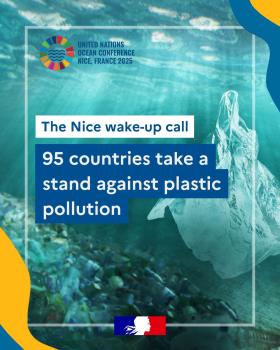
These scientific messages were also carried by Xavier Cousin and Marie-France Dignac at the third United Nations Ocean Conference (UNOC), held in Nice in June 2025. Just weeks before the negotiations resume in Geneva, the summit also marked a political turning point: through the “Nice Call”, France brought together 95 countries in support of an ambitious plastics treaty. It served as a reminder that, in the face of this global challenge, only international cooperation and a commitment to robust science will make it possible to reach an agreement that meets the scale of the plastic crisis.
About our scientists
Xavier Cousin
A researcher in the MARBEC Joint Research Unit, Xavier Cousin has spent nearly 10 years studying the effects of microplastics and their associated chemical pollutants on fish physiology.
- He has taken part in numerous European and French research projects, including EPHEMARE, RESPONSE, PLASTIC-Seine, PALMITO, PREVENT, and BIOMIC. During the latter, he collaborated with Muriel Mercier-Bonin.
- Cousin’s work has revealed that plastics cause chronic toxicity via poorly understood mechanisms that alter major biological functions and that could threaten the persistence of populations of aquatic organisms.
- In addition to carrying out research, he is involved in science-policy dialogues. Since 2023, he and Marie-France Dignac have worked with diplomatic advisors to the French president and several ministers, helping elucidate France’s positions ahead of negotiation sessions. Cousin regularly appears in the media (e.g., written press, radio) to raise awareness about human health and environmental issues related to plastics. He has produced a 10-episode radio series dedicated to plastic pollution and gives talks to the general public and schoolchildren.
Marie-France Dignac
A research director at the Institute of Ecology and Environmental Sciences of Paris (iEES Paris), Marie-France Dignac is coordinating two projects on microplastics in soils: the ANR project eDIP and the ADEME project Plastisol. Her work focuses on the respective impacts of plastic polymers and additives, as well as their behaviour and toxicity in various soil compartments.
- Dignac’s research team has shown that spreading urban compost on agricultural soils has resulted in the latter’s contamination by microplastics. At INRAE Qualiagro's long-term experimental site, 22 years of compost spreading has resulted in up to 400 kg of large microplastics per hectare, an amount equivalent to 80,000 plastic bags. These particles accumulate deep within the soil, and there is currently no way to remove them.
- Dignac’s research has also shown that plastics have ecotoxicological effects on soil organisms and alter carbon and nitrogen cycles, ultimately threatening soil fertility and food security. Her findings are thus providing evidence of an environmental health issue whose impacts remain underestimated.
- In addition to her scientific publications, she collaborated with Xavier Cousin to editorially coordinate the books Pollution plastique : la biodiversité menacée [Plastic pollution: a menace for biodiversity] and Le plastique, un poison si pratique [Plastic—a practical poison].
Muriel Mercier-Bonin
A research director in the TOXALIM Research Unit, Muriel Mercier-Bonin explores the effects of micro- and nanoplastics on human health, focusing on the digestive system. Her work employs in vitro and in vivo approaches to identify the mechanisms responsible for altering the intestinal microbiota and barrier functions.
- She coordinated the INRAE projects PlasToX and Next-PlasToX, whose findings were the first to show that chronic exposure to polyethylene microplastics can cause disequilibrium in the human gut microbiota, notably by favouring certain pathogenic bacteria and reducing the production of key metabolites. These results were published in the Journal of Hazardous Materials and received broad media coverage.
- At present, Mercier-Bonin is head of the ANSES project NanoPlastX and the ANR project microPLAstox, both looking at nanoplastics, and is involved in the European project ICEBERG, which is focused on plastic pollution in the Arctic Ocean and its effects on vulnerable populations.
- She was one of the three researchers leading the INRAE/CNRS collective scientific assessment of the uses and impacts of plastics in agriculture and food systems. The assessment’s conclusions were published in May 2025 and will directly inform public debates and French national policies.
